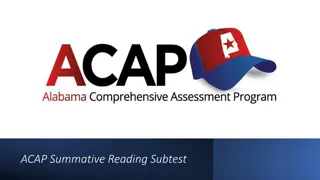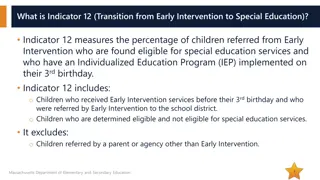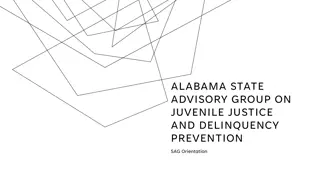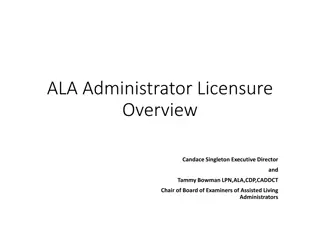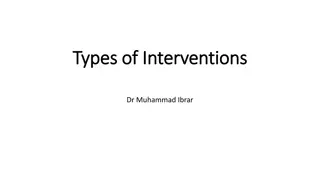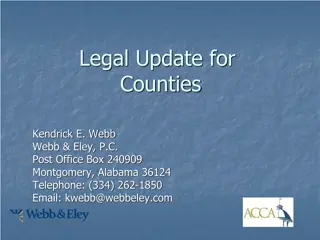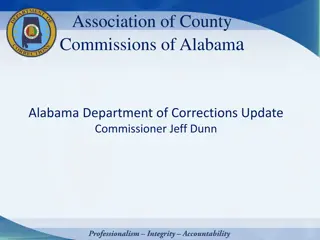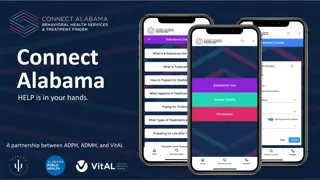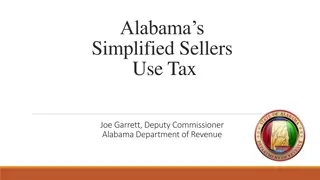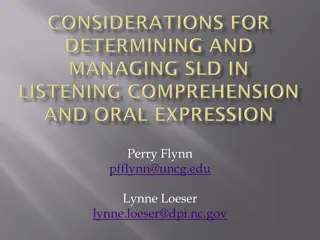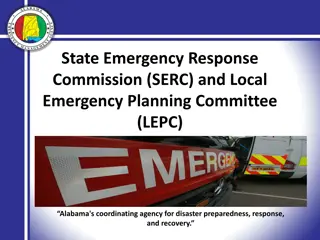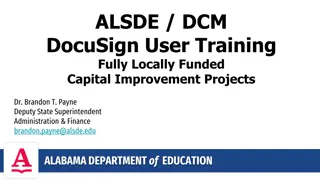Special Education Process and Intervention Strategies in Alabama State Department of Education
Special Education Process and Intervention Strategies in Alabama's State Department of Education involve implementing intervention strategies in the general education program before referring a child for special education evaluation. The process includes referral meetings, consent for evaluation, initial eligibility, IEP development, annual reviews, and more. Certain exceptions allow for immediate evaluation in severe cases. The IEP Team, comprising various education professionals and parents, plays a crucial role in evaluating and deciding on special education services for the child.
Download Presentation

Please find below an Image/Link to download the presentation.
The content on the website is provided AS IS for your information and personal use only. It may not be sold, licensed, or shared on other websites without obtaining consent from the author.If you encounter any issues during the download, it is possible that the publisher has removed the file from their server.
You are allowed to download the files provided on this website for personal or commercial use, subject to the condition that they are used lawfully. All files are the property of their respective owners.
The content on the website is provided AS IS for your information and personal use only. It may not be sold, licensed, or shared on other websites without obtaining consent from the author.
E N D
Presentation Transcript
Special Education Process Intervention Strategies in the General Education Class Referral Meeting Consent for Evaluation Initial Evaluation & Initial Eligibility Consent for Special Education Services Initial IEP if Found Eligible for Sp. Ed. Services Reevaluation Annual IEP Review IEP Review and Revision
Before a child is referred for sp. ed. evaluation or concurrently during the evaluation process, intervention strategies must be implemented in the gen. ed. program and monitored by the Problem Solving Team (PST) for an appropriate period of time (minimum of 8 weeks), and be determined unsuccessful.
This rule may be waived for a child who has severe problems that require immediate attention, for 3 and 4-year olds, for 5-year olds who have not been in kindergarten, for children with articulation, voice, or fluency problems only, for children with a medical diagnosis of traumatic brain injury, and for a child who has been referred by his or her parent. AAC 290-8-9.01(4).
Referral Meeting Cont. The IEP Team must review the referral, including documentation of intervention strategies and processes, and determine in a timely manner if the child will be evaluated for special education services. The IEP Team is made up of a minimum of 1 general ed. teacher knowledgeable of the child and/or the curriculum, 1 special ed. teacher, an LEA official, parent, and the student if applicable.
Referral Meeting cont. If the IEP Team determines that the child should not be evaluated for sp. ed. Services, written notice must be given to the parent and the child must be referred back to the PST. If the IEP Team determines that the child should be evaluated for sp. Ed. Services, the public agency must obtain the parents written consent for evaluation.
Before an initial evaluation can be conducted, the public agency must, after providing notice, obtain informed written consent as required. AAC 290-8-9.02(1)(a).
Initial Evaluation & Initial Eligibility The public agency has 60 calendar days from the date signed consent is obtained to conduct and complete an initial evaluation. The public agency has 30 calendar days from the completion of the evaluations to determine initial eligibility. The timeline runs regardless of any scheduled interruptions in the scholastic year or the scheduled summer vacation.
Initial Evaluation & Initial Eligibility Cont. EXCEPTION The timeline doesn t apply if the parent of a child repeatedly fails or refuses to produce the child for evaluation. The timeline doesn t apply if a child enrolls in a school of another public agency after the relevant timeline has begun prior to completion of the initial evaluation. This only applies if the receiving public agency is making sufficient progress to ensure a prompt completion of the evaluation, and the parent and receiving public agency agree to a specific time when the evaluation will be completed. AAC 290-8-9.02(1)(b)
Consent for Special Education Services A public agency must obtain written consent from the parent before the initial provision of special education and related services can be offered to the child. This consent may be obtained after an eligibility determination, but must be prior to services being rendered. AAC 290-8-9.04(4)(a)
Initial IEP if Found Eligible 30 calendar days to develop an IEP after initial eligibilitiy determination. IEP must be in effect in order for child to receive special education and/or related services. There can be no delay in implementing a child s IEP while determining a payment source for special education or related services.
Reevaluations shall not occur more than once a year, unless the parent and the public agency agree otherwise, and MUST occur at least once every 3 years. Reevaluation AAC 290-8-9.02(6)(c)
Annual IEP Review The IEP must be reviewed 1 time every 12 mo. Each IEP must be reviewed or another one in place by the signature date on the current IEP plus 1 year. The duration date on the IEP is the date the IEP starts and ends.
IEP Review and Revision If the parents or the child s teacher has reason to suspect that an IEP needs a revision, an IEP meeting may be requested at any time. The school must conduct the IEP meeting within 30 days of the request. AAC 290-8-9.05(11)(A)3
CONFIDENTIALITY Parents have the right to review their child s confidential records. The school must provide the parent a copy of the child s records when requested. The parent may request an amendment of confidential records at any time. The school must obtain signed parental consent to release confidential student records to outside agencies (Doctors, DHR, counselors, etc.)
CONFIDENTIALITY CONT Students have the right to privacy of their records. There is a systematic process for destroying confidential student records and is determined by the LEA. All personally identifiable information must be secure at all times Records are to be locked in a filing cabinet Records are to be secure in the computer system
Shortened School Day A student with a disability may not arrive at school after typical peers and may not be released prior to typical peers unless they have a shortened school. A shortened school day is determined by an IEP team and must be justified in order to arrive later or dismiss earlier.



